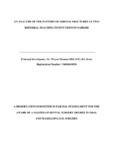| dc.contributor.author | Kizito, Mariita | |
| dc.date.accessioned | 2015-12-16T07:04:54Z | |
| dc.date.available | 2015-12-16T07:04:54Z | |
| dc.date.issued | 2015 | |
| dc.identifier.uri | http://hdl.handle.net/11295/93603 | |
| dc.description | Thesis | en_US |
| dc.description.abstract | Background: Warfarin is indicated for the prophylaxis and treatment of thrombosis.
Despite being the oral anticoagulant of choice in many countries, its use is associated
with severe side effects notably bleeding and thrombosis. Warfarin has a narrow
therapeutic index suggesting that the risk of one developing these complications is quite
high if the predisposing factors are not known and measures put in place to counter them.
Patients’ knowledge on anticoagulation and other patient factors, just like in most chronic
illnesses, may have an impact on anticoagulation control.
Objective
The objective of this study was to assess the patients’ knowledge on anticoagulation and
explore the patient factors affecting anticoagulation control among adult outpatients
taking warfarin at Kenyatta National Hospital.
Methodology
This was a cross-sectional study carried out at the hemato-oncology, cardiac and cardiothoracic
clinics of Kenyatta National Hospital during the months of March to May 2015.
Adult outpatients taking warfarin who consented to the study were recruited
consecutively during the clinic days. A pre-designed structured questionnaire was
administered to obtain information from the patients about their knowledge of and
adherence to anticoagulation therapy and to identify patient factors that may impact on
one’s anticoagulation control. The patients’ INR was also measured. The data was
analyzed using the statistical software, SPSS version 20.
Results
A total of 147 patients completed the study of whom majority (74.1%) were females. The
median age [range] was 41[18-74] years. Eighty percent had scores indicative of
insufficient knowledge on anticoagulation control (score <75%). Deficiency in
knowledge was worst in the aspects of drug and food interactions with warfarin, effect of
missing a warfarin dose, interpretation of INR values and recognition of symptoms of
over or under dosing warfarin. Adequate knowledge on anticoagulation was statistically
significantly associated with marital status (p=0.015), level of education (p=0.014) and
indication for oral anticoagulation therapy (p=0.032). Adherence to warfarin and
anticoagulation control were low at 52.2% and 43.5% respectively. Independent
predictors of poor anticoagulation were female gender (p=0.011) and lower education level
(p=0.005). Patient knowledge on anticoagulation and adherence to warfarin were not statistically
significantly associated with anticoagulation control (p=0.794) and (p=0.834).
Conclusion
Knowledge on and adherence to anticoagulation therapy in patients on warfarin at KNH
is poor. The level of anticoagulation control is inadequate. Female gender and lower
education level were predictors of poor anticoagulation. Knowledge on anticoagulation
was however not associated with anticoagulation control.
Recommendations
Further larger studies incorporating all the variables that can affect anticoagulation
control should be conducted at KNH to identify the causes of inadequate anticoagulation
control. | en_US |
| dc.language.iso | en | en_US |
| dc.publisher | University of Nairobi | en_US |
| dc.title | Assessment of the patient factors impacting on oral anticoagulation therapy among adult outpatients at Kenyatta national hospital | en_US |
| dc.type | Thesis | en_US |
| dc.description.department | a
Department of Psychiatry, University of Nairobi, ; bDepartment of Mental Health, School of Medicine,
Moi University, Eldoret, Kenya | |

